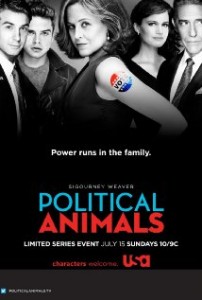 Showtime’s new mini-series “Political Animals” insists that it is not really a knock-off on the saga that is Bill and Hillary Clinton: the resemblance between Sigourney Weaver’s Elaine Barrish and Hillary is merely the surface match between two former First Ladies who endured a presidential sex scandal involving a junior staffer, subsequently launched their own political careers, and lost the Democratic presidential nomination to a smooth, if distant, senator who brings Elaine/Hillary into the Secretary of State’s position. Elaine’s ex, former president Donald “Bud” Hammond, (Ciaran Hinds) just happens to sound, charm, and manipulate like William Jefferson Clinton.
Showtime’s new mini-series “Political Animals” insists that it is not really a knock-off on the saga that is Bill and Hillary Clinton: the resemblance between Sigourney Weaver’s Elaine Barrish and Hillary is merely the surface match between two former First Ladies who endured a presidential sex scandal involving a junior staffer, subsequently launched their own political careers, and lost the Democratic presidential nomination to a smooth, if distant, senator who brings Elaine/Hillary into the Secretary of State’s position. Elaine’s ex, former president Donald “Bud” Hammond, (Ciaran Hinds) just happens to sound, charm, and manipulate like William Jefferson Clinton.
The parallels do break: Elaine Barrish, we learn by episode two, executed the forgiving spouse role only up to a point, divorcing her husband in the aftermath of her defeat in the primaries. And unlike Hillary, Elaine’s loyalties to her new boss are skin deep at best: she is already plotting to take him on in the next campaign. But the severance in the time line does not begin, or even attempt, to mask the obvious: the show is a guilty pleasure window into what the Clintons’ personal and public chaos might look like from the inside, and if the characterizations so far can seem more like an impersonation of the Clintons than an real exploration, it is richly entertaining in the same way the originals are. “Political Animals”, like the real thing it is based on, is a brew of tawdriness, deceit, inspiration, and fortitude, that works in spite of all the reasons it shouldn’t.
 Among the reasons it shouldn’t work: the storylines to date–a mini hostage crisis in the Middle East, the Hammonds’ juggling of one son’s engagement party with the other son’s emotional spiral–are pedestrian stuff. The personal sketches reach for their share of clichéd foibles: the young reporter who exposed Bud Hammond’s escapades and has trained her sights on Elaine Barrish has her own penchant for personal turbulence and seems to have boundary issues of her own; the two Hammond children are sons (thankfully, Chelsea remains outside creative license, at least for now) and in predictable modern cinematic fashion, one is tormented, artistically gifted, and gay; the other ferociously protective and resentful of his father’s capriciousness, but if the teasers at the end of the last episode are right, possibly possessed of some of his father’s weaknesses. If cultural stereotypes are your peeve, some of the clichés touch on troubling ground: the Asian woman who is the fiancee of Douglas Hammond is a bulimic perfectionist whose first generation parents are inordinately status conscious; the foreign diplomats are all lecherous or spineless, and there is a weird dearth of African American or Latino characters. This is not the “Good Wife”, whose regular and recurring cast seamlessly integrates every strand of the social rainbow without really trying, and gives each the gift of individuality.
Among the reasons it shouldn’t work: the storylines to date–a mini hostage crisis in the Middle East, the Hammonds’ juggling of one son’s engagement party with the other son’s emotional spiral–are pedestrian stuff. The personal sketches reach for their share of clichéd foibles: the young reporter who exposed Bud Hammond’s escapades and has trained her sights on Elaine Barrish has her own penchant for personal turbulence and seems to have boundary issues of her own; the two Hammond children are sons (thankfully, Chelsea remains outside creative license, at least for now) and in predictable modern cinematic fashion, one is tormented, artistically gifted, and gay; the other ferociously protective and resentful of his father’s capriciousness, but if the teasers at the end of the last episode are right, possibly possessed of some of his father’s weaknesses. If cultural stereotypes are your peeve, some of the clichés touch on troubling ground: the Asian woman who is the fiancee of Douglas Hammond is a bulimic perfectionist whose first generation parents are inordinately status conscious; the foreign diplomats are all lecherous or spineless, and there is a weird dearth of African American or Latino characters. This is not the “Good Wife”, whose regular and recurring cast seamlessly integrates every strand of the social rainbow without really trying, and gives each the gift of individuality.
Read the rest of…
Artur Davis: “Political Animals” is Telling Us Something
 The Onion dominates print humor on the web leaving an opening for video humor, which seemed more difficult by comparison.
The Onion dominates print humor on the web leaving an opening for video humor, which seemed more difficult by comparison.









